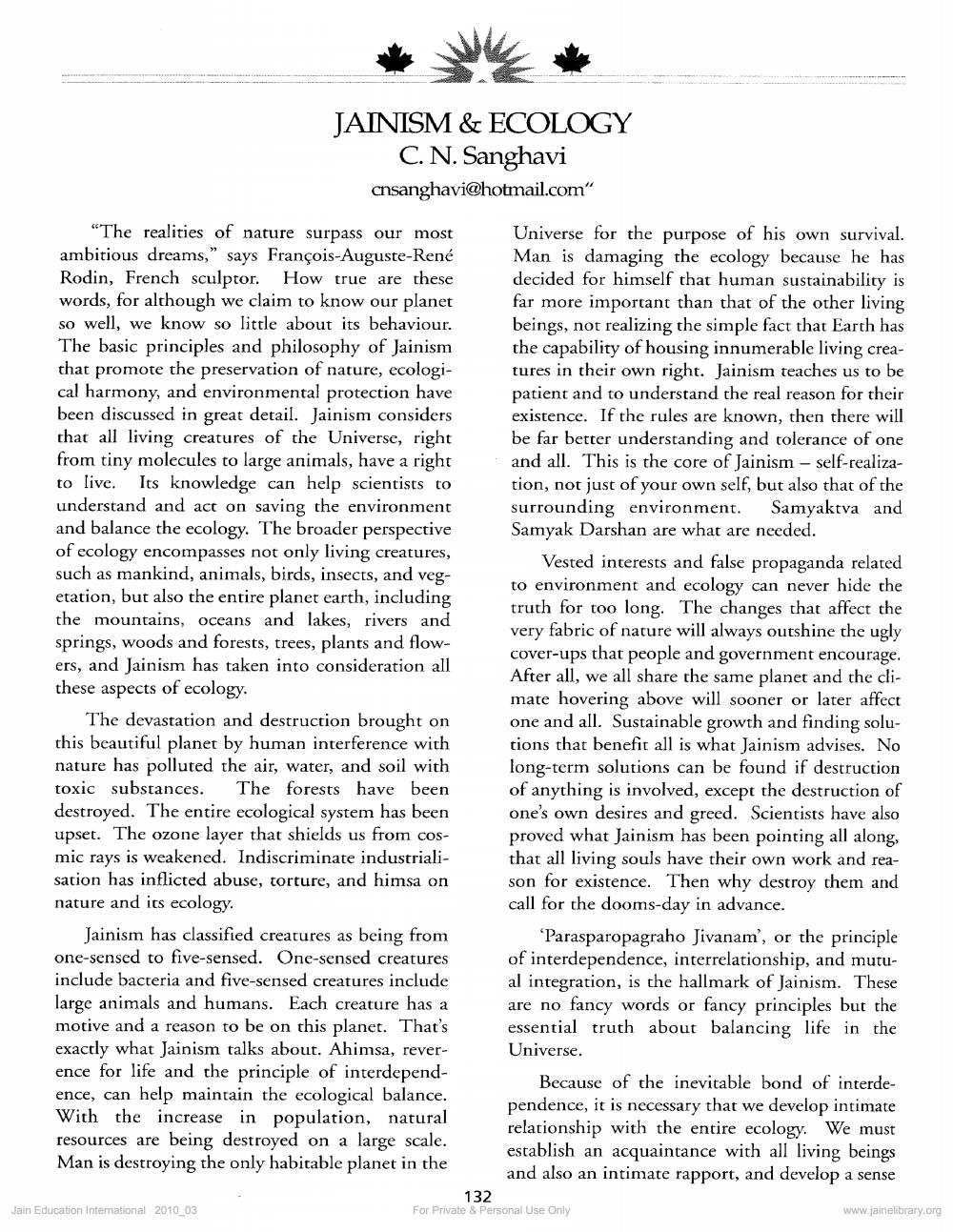________________
JAINISM & ECOLOGY C. N. Sanghavi
[email protected]"
"The realities of nature surpass our most ambitious dreams," says François-Auguste-René Rodin, French sculptor. How true are these words, for although we claim to know our planet so well, we know so little about its behaviour. The basic principles and philosophy of Jainism that promote the preservation of nature, ecological harmony, and environmental protection have been discussed in great detail. Jainism considers that all living creatures of the Universe, right from tiny molecules to large animals, have a right to live. Its knowledge can help scientists to understand and act on saving the environment and balance the ecology. The broader perspective of ecology encompasses not only living creatures, such as mankind, animals, birds, insects, and vegetation, but also the entire planet earth, including the mountains, oceans and lakes, rivers and springs, woods and forests, trees, plants and flowers, and Jainism has taken into consideration all these aspects of ecology.
The devastation and destruction brought on this beautiful planet by human interference with nature has polluted the air, water, and soil with toxic substances. The forests have been destroyed. The entire ecological system has been upset. The ozone layer that shields us from cosmic rays is weakened. Indiscriminate industrialisation has inflicted abuse, torture, and himsa on nature and its ecology.
Jainism has classified creatures as being from one-sensed to five-sensed. One-sensed creatures include bacteria and five-sensed creatures include large animals and humans. Each creature has a motive and a reason to be on this planet. That's exactly what Jainism talks about. Ahimsa, reverence for life and the principle of interdependence, can help maintain the ecological balance. With the increase in population, natural resources are being destroyed on a large scale. Man is destroying the only habitable planet in the
Jain Education International 2010_03
Universe for the purpose of his own survival. Man is damaging the ecology because he has decided for himself that human sustainability is far more important than that of the other living beings, not realizing the simple fact that Earth has the capability of housing innumerable living creatures in their own right. Jainism teaches us to be patient and to understand the real reason for their existence. If the rules are known, then there will be far better understanding and tolerance of one and all. This is the core of Jainism - self-realization, not just of your own self, but also that of the surrounding environment. Samyaktva and Samyak Darshan are what are needed.
Vested interests and false propaganda related to environment and ecology can never hide the truth for too long. The changes that affect the very fabric of nature will always outshine the ugly cover-ups that people and government encourage. After all, we all share the same planet and the climate hovering above will sooner or later affect one and all. Sustainable growth and finding solu tions that benefit all is what Jainism advises. No long-term solutions can be found if destruction of anything is involved, except the destruction of one's own desires and greed. Scientists have also proved what Jainism has been pointing all along, that all living souls have their own work and reason for existence. Then why destroy them and call for the dooms-day in advance.
'Parasparopagraho Jivanam', or the principle of interdependence, interrelationship, and mutual integration, is the hallmark of Jainism. These are no fancy words or fancy principles but the essential truth about balancing life in the
Universe.
Because of the inevitable bond of interdependence, it is necessary that we develop intimate relationship with the entire ecology. We must establish an acquaintance with all living beings and also an intimate rapport, and develop a sense
132 For Private & Personal Use Only
www.jainelibrary.org




